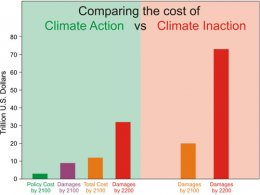Climate change global issues
Cost of inaction on climate change far higher than the cost of action
A number of countries and companies have long been worried that the costs of tackling climate change (prevention, mitigation, adaptation, etc) will be prohibitive and would rather deal with the consequences. They often assume (or hope) the consequences will not be as bad as scientists are predicting.
As an example, in December 2011, Canada pulled out of the Kyoto climate treaty — which it is legally allowed to do — to condemnation domestically and internationally. One of the main concerns had been the cost to the tax payer: (CAN) $14bn.
Yet, the economic costs of inaction are in the trillions:

Economic studies have consistently shown that mitigation (such as putting a price on carbon emissions) is several times less costly than trying to adapt to climate change. The above chart shows total costs for action on climate change by 2100 to be about $11 trillion while damages will be about $8 trillion. With inaction, however, damages by 2100 will be around $20 trillion. By 2200, these numbers shoot up (over $30 trillion if action taken, or over $70 if no action taken). Source: The economic impacts of carbon pricing, SkepticalScience.com, March 1, 2012
(Some believe one of Canada’s motivations to leave Kyoto was on its “desire to protect the lucrative but highly polluting exploitation of tar sands, the second biggest oil reserve in the world”, as The Guardian had noted.)
Concerns about costs often ignore the other benefits of action
Climate change problems also affect people’s health directly, as well as impacting the environment. For example, fossil fuels used by cars in heavily congested areas lead to additional pollutants harmful to human health. Tackling climate change by limiting fossil fuel use and investing heavily in alternatives has the additional benefit of improving health, and even possibly reducing traffic congestion. This is the view of some major reports recently released.
Economist Paul Krugman summarizes a couple:
In effect, these studies are saying that not only could climate change costs be minimized through action, but it could turn into economic benefits.
Another concern by some countries is they can’t do things — even if they wanted to — because if other countries are not subjected to carbon emission reduction targets then they will lose out competitively. However, the IMF notes that the additional economic benefits of reducing carbon emissions make it worth pursuing with or without others doing it.

